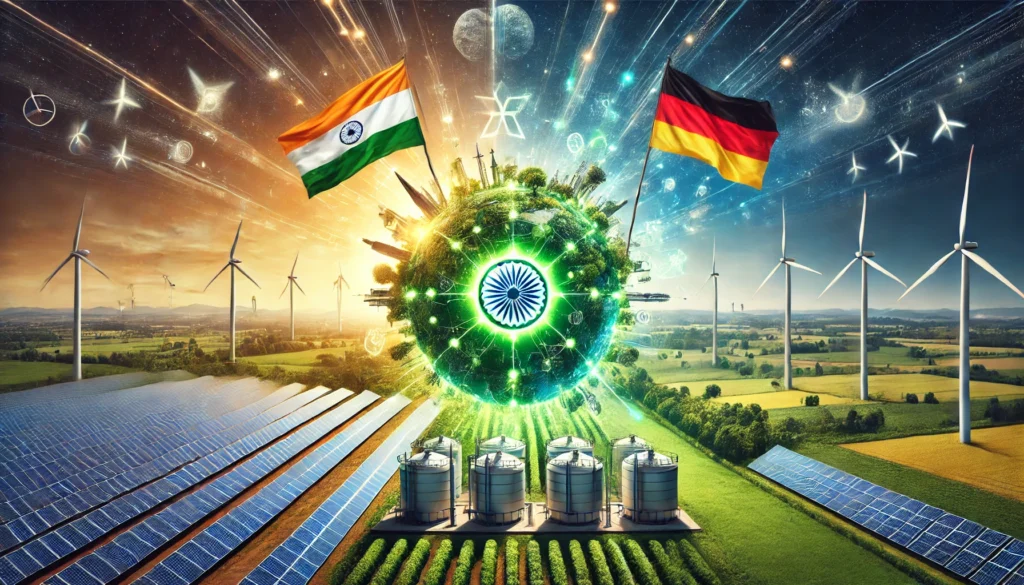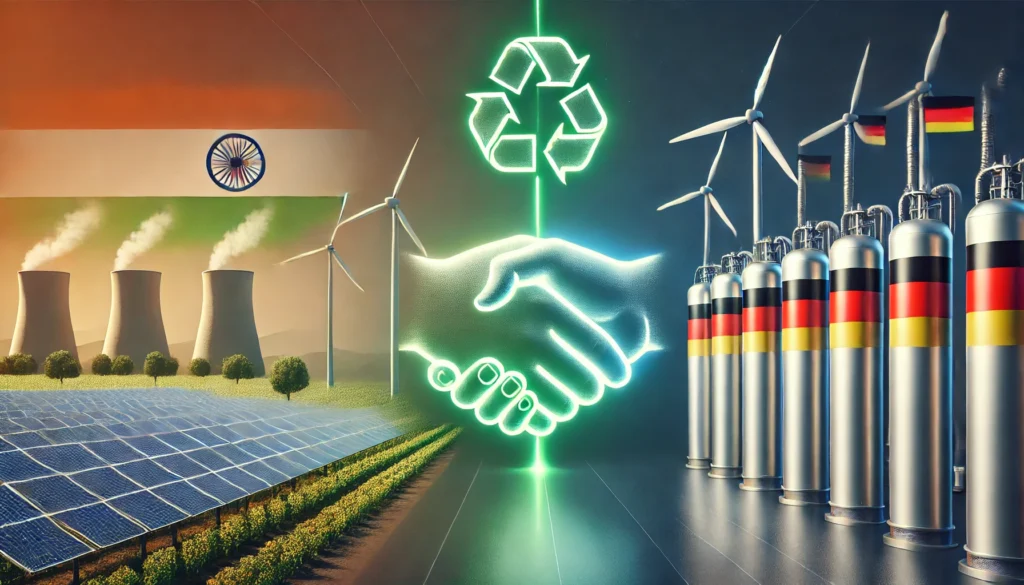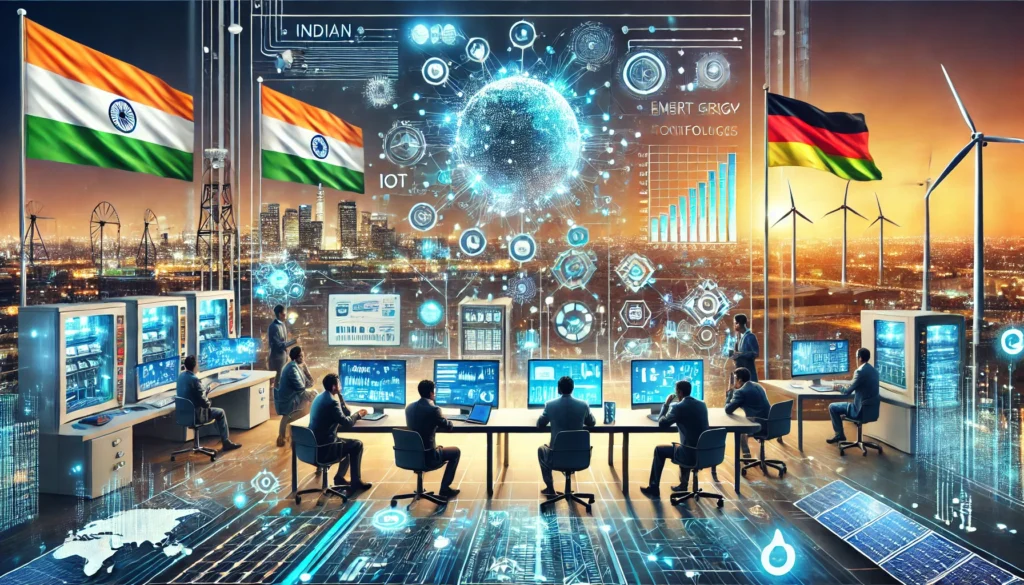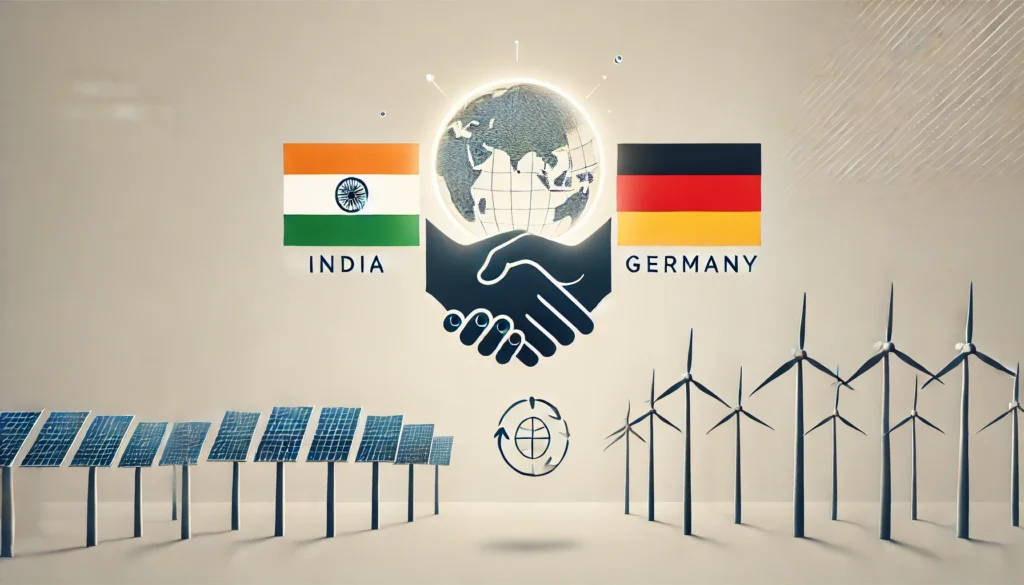- Home
- Global Exchange & Travel
- Technology
- Green Energy: India- 2nd World ...
Introduction
This blog post explores the transformative potential of Indo-German collaborations within the renewable energy sector, emphasizing opportunities for mutual growth and innovation. By highlighting the strengths of the two nations, with their opportunities, and by showcasing real-world examples, it aims to inspire partnerships that promote sustainability and strengthen economic and cultural ties between India and Germany.
India’s growing global connections, particularly in renewable energy, have paved the way for transformative partnerships. As a cornerstone of combating climate change and building a sustainable economy, Indo-German collaborations stand as a beacon of innovation, driving progress through international cooperation.

Indo-German Collaboration: Pioneering a Greener Economy
India’s deepening ties with global partners have set the stage for transformative collaborations, particularly in the renewable energy sector. This pivotal industry is not only at the forefront of combating climate change, but also serves as a cornerstone for building a sustainable economy. Within this context, Indo-German partnerships shine as a beacon of innovation and opportunity, showcasing the potential of international cooperation.
India’s scalable manufacturing capabilities and cost-effectiveness harmonize with Germany’s cutting-edge technological expertise and engineering precision, creating a formidable alliance in the renewable energy sector. This synergy enables the two nations to lead the global transition towards sustainability, driving advancements in areas such as solar and wind energy, green hydrogen production, and energy storage solutions.
From establishing joint ventures that leverage India’s abundant renewable resources to deploying Germany’s advanced technologies, ‘these collaborations are not only paving the way for innovative energy solutions, but also unlocking opportunities in emerging markets worldwide.’ As India and Germany strive to meet ambitious sustainability targets, their partnership exemplifies the ‘transformative power of international cooperation’ in fostering a greener, more prosperous future for the global community.

India’s deepening ties with global partners, including the European Union, have set the stage for transformative collaborations, particularly in the renewable energy sector.
Before we dive deeper, let us take a minute to understand what this sector comprises, and how it holds the key to the future.
This pivotal industry is not only at the forefront of combating climate change, but also serves as a cornerstone for building a sustainable economy. Within this context, Indo-German partnerships shine as a beacon of innovation and opportunity, showcasing the potential of international cooperation.
India’s scalable manufacturing capabilities and cost-effectiveness harmonize with Germany’s cutting-edge technological expertise and engineering precision, creating a formidable alliance in the renewable energy sector. This synergy enables the two nations to lead the global transition towards sustainability, driving advancements in areas such as solar and wind energy, green hydrogen production, and energy storage solutions.
From establishing joint ventures that leverage India’s abundant renewable resources to deploying Germany’s advanced technologies, ‘these collaborations are not only paving the way for innovative energy solutions, but also unlocking opportunities in emerging markets worldwide.’ As India and Germany strive to meet ambitious sustainability targets, their partnership exemplifies the ‘transformative power of international cooperation’ in fostering a greener, more prosperous future for the global community.
1. Expansion of Green Hydrogen Initiatives
Global Context and Climate Goals
Green hydrogen is a game-changer for decarbonizing energy-intensive industries like steel, cement, and heavy transportation. Produced using renewable energy, it aligns with global climate goals, including the Paris Agreement, Net-Zero Targets (India by 2070, Germany by 2045), and the European Green Deal (climate neutrality by 2050). It also supports UN SDGs, such as Goal 7 (Clean Energy) and Goal 13 (Climate Action), driving the transition to a sustainable, low-carbon economy.
Opportunities for Indian Companies
- Green Hydrogen Production Hubs: Under India’s National Green Hydrogen Mission, the target is to produce 5 million metric tons of green hydrogen annually by 2030.
- Export Potential: India’s competitive renewable energy costs position it as a key player in the global green hydrogen market, offering a strategic advantage for exporting to energy-intensive regions like the EU, including Germany. With ambitious plans under its National Green Hydrogen Mission, India envisions producing up to 10 million metric tons (MMT) of green hydrogen, with a strong emphasis on exports, further solidifying its role as a global hub for sustainable energy solutions.
- Collaborations with German Firms: Partnerships with German companies can facilitate advanced technology transfers, particularly in electrolyzer deployment, enhancing India’s hydrogen production capacity.
Opportunities for German Companies
- Germany’s Hydrogen Strategy: Germany’s Green Hydrogen Policy (2023) underscores its goal of climate neutrality by 2045, creating opportunities for collaboration with Indian firms in hydrogen production, technology transfer, and R&D. German companies can export electrolyzer technologies, partner on hydrogen storage and fuel cell R&D, and strengthen supply chains, fostering mutual growth and global
- Technology Development and Export: German firms, such as Siemens Energy, have an edge in electrolyzer technology and can expand their presence in India by collaborating on hydrogen production projects.
- Supply Chain Integration: Investing in India’s hydrogen initiatives ensures a reliable supply chain for industrial decarbonization in Europe.
Collaborative Research: “Joint R&D with Indian companies in hydrogen storage, fuel cells, and transportation” can accelerate global adoption and reduce costs.
2. Solar and Wind Energy Infrastructure Development
Global Context
Solar and wind energy form the backbone of the global renewable energy transition. India and Germany’s complementary strengths in these sectors offer significant opportunities for collaboration.
Opportunities for Indian Companies
- Solar Panel Manufacturing and Export: India, though currently holding a small share in global PV production, is strategically scaling up its capabilities under the PLI Scheme. With abundant resources, cost-effective manufacturing, and a growing focus on quality, India is poised to become a key player in supplying affordable panels to markets like Germany, addressing critical supply gaps and diversifying global sources for renewable energy components.
- Offshore Wind Development: With a target of 30 GW of offshore wind capacity by 2030, India can collaborate with German firms that bring expertise in offshore wind technology.
- Hybrid Renewable Projects: Indian firms can pioneer integrated wind-solar farms, optimizing energy output while exporting technical expertise globally.
Opportunities for German Companies
- Advanced Wind Technology Deployment: German firms can introduce cutting-edge turbine technologies to India’s growing wind energy sector.
- Investment in Solar Parks: German investors can capitalize on high-return solar park projects in India, supporting its energy transition.
- Project Financing and Management: Institutions like KfW can provide financial support for large-scale Indian renewable projects, ensuring a mutually beneficial partnership.

3. Energy Storage Solutions
Global Context
The variability of renewable energy sources necessitates advanced energy storage systems for grid stability and reliability.
Opportunities for Indian Companies
- Battery Manufacturing: India’s PLI Scheme for Advanced Chemistry Cell (ACC) Batteries is attracting investment in domestic manufacturing.
- Grid-Level Storage Projects: Collaborating with German firms, Indian companies can deploy energy storage solutions to support large-scale renewable energy projects.
Opportunities for German Companies
- Export of Advanced Battery Technologies: Companies like VARTA AG can partner with Indian firms to produce and deploy lithium-ion and solid-state batteries.
- Collaborative R&D: Joint research can focus on improving battery efficiency, recycling, and lifecycle management.
- Energy Storage for EVs: German firms can supply advanced batteries to India’s rapidly growing EV market.
4. Smart Grid Technologies and Digital Energy Platforms
Global Context
Smart grids are essential for the seamless integration of renewable energy, offering real-time monitoring, demand management, and efficient energy distribution.
Opportunities for Indian Companies
- AI-Driven Solutions: Indian tech firms can develop AI-based tools to optimize energy grid performance.
- Export of IT Expertise: Collaborating with German utilities, Indian companies can deliver customized solutions for energy analytics and monitoring.
Opportunities for German Companies
- IoT-Enabled Grid Management: German firms can introduce IoT and machine learning solutions to enhance India’s grid systems.
- Pilot Projects: Testing advanced technologies in India’s diverse energy market provides insights for broader deployment.

5. Circular Economy and Recycling in Renewable Energy
Global Context
Sustainability in renewable energy extends beyond production to the recycling and lifecycle management of infrastructure.
Opportunities for Indian Companies
- Recycling Facilities: Establishing facilities for recycling end-of-life solar panels and EV batteries can minimize environmental impact.
- Collaboration on Circular Practices: Partnerships with German firms can bring advanced recycling technologies to India.
Opportunities for German Companies
- Material Recovery Expertise: Setting up recycling operations in India can leverage Germany’s circular economy experience.
- Sustainability Consulting: German firms can guide Indian companies on implementing comprehensive circular economy strategies.
6. Investment in Startups and Innovation Hubs
Global Context
Innovation is a critical driver for renewable energy advancement, with startups leading the way in developing efficient and cost-effective solutions.
Opportunities for Indian Companies
- Innovation Hubs: Indian firms can establish hubs to attract German startups specializing in renewable energy.
- Venture Capital Investments: Investing in German startups working on advanced technologies, such as green hydrogen and smart grids, can foster mutual growth.
Opportunities for German Companies
- Collaborating with Indian Startups: Germany can leverage India’s vibrant startup ecosystem to co-develop scalable renewable solutions.
- R&D Partnerships: Testing new technologies in India’s diverse environments can accelerate product refinement.
7. Exporting Expertise through Global Renewable Projects
Global Context
Rising renewable energy demand in developing regions like Africa and Southeast Asia creates opportunities for Indo-German collaboration in international projects.
Opportunities for Joint Ventures
- Collaboration in Third Markets: Combining India’s scalability with Germany’s technological expertise, joint ventures can bid on large-scale projects globally.
- Leveraging the International Solar Alliance (ISA): German companies can tap into ISA’s extensive network, facilitated by India, to access new markets.

The Path Forward: A Model Partnership for Sustainability
The Indo-German partnership in renewable energy exemplifies the power of international collaboration. By leveraging complementary strengths and fostering innovation, both nations can accelerate the global transition to sustainable energy. This strategic alliance not only addresses climate challenges but also sets a benchmark for cooperative efforts in building a greener, more prosperous world.
Sources
- Indo-German Energy Forum (IGEF): IGEF
- German Development Bank (KfW): KfW Development Bank
- Ministry of New and Renewable Energy (MNRE): MNRE
- EU-India Clean Energy and Climate Partnership: CECP-EU
- International Solar Alliance (ISA): ISA
- National Green Hydrogen Mission, India: Green Hydrogen Mission
- Siemens Energy: Siemens Energy
- Production-Linked Incentive Scheme: PLI Scheme
- https://mnre.gov.in/en/national-green-hydrogen-mission/
- National Hydrogen Strategy Update



